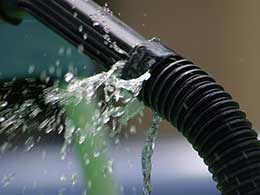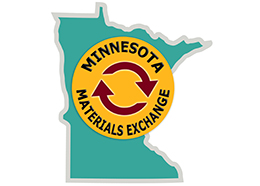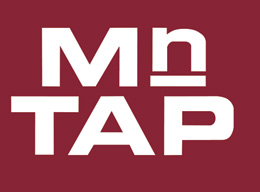Inside the Newsletter:
Industrial Water Conservation | Reuse in Action | MnTAP is Hiring | TCE Alternatives
A Ten-Year Partnership Supporting Industrial Water Conservation
In 2022, MnTAP marked the 10th anniversary of a partnership with Metropolitan Council Environmental Services (MCES) Water Supply Planning Unit with funding through a grant from the Clean Water, Land, and Legacy Amendment. The work is focused on industrial water efficiency in geographic areas served by MCES. In an effort to carry out the mission of providing resilient water supplies for the Metro region, MCES has funded MnTAP technical assistance and MnTAP Intern Program efforts to assist businesses with identification and implementation of water efficiency projects. MCES seeks to maximize the water efficiency achieved in order to maintain sustainable water supplies across the metro area.
This highly successful collaboration supports MnTAP interns working with industrial facilitiestoidentify and launch implementation of projects that reduce industrial water use and help maintain sustainable water supplies across the Twin Cities region.
This long-standing relationship has shown substantial documented success.
- 44 MnTAP facilitated intern projects in the metro area
- 253 recommendations with 417 million gallons of annual water savings potential
- 108 implemented recommendations to date (43%)
- 166 million gallons per year of implemented water conservation (40%)
- $1.7 million annually in avoided cost associated with water use
To inform future outreach efforts and identify leverage points that encourage implementation of industrial water efficiency activities, a portion of the intern effort in 2020 and 2021 was directed to analyze past industrial water recommendations. This analysis classified the types of industrial water efficiency opportunities identified and the rates of implemented recommendations and created a search tool to direct facility operations staff to water conservation recommendations and intern project summaries that may be applicable to their operations. This work has been funded by MCES through a grant from the Clean Water, Land, and Legacy Amendment.
This partnership has been renewed to support 15 additional intern projects through 2025. An additional MnTAP project funded through the Minnesota Environment and Natural Resources Trust Fund provides training, site assessments and intern projects for facilities outside the metro area.
For More Information Contact
Reuse in Action
In October 2022, the Sustainability Director at a large healthcare facility contacted MnTAP requesting help with clearing out a kitchen storage room full of excess supplies and equipment. Upon walking into the room for the first time in December, it was evident this project would require attention to detail and persistence. Items in the space ranged from pristine gold-trimmed banquet chafers to ceramic dishware and drinkware, carafes, metal, technologies, organizational storage equipment, silverware, and kitchen racks.
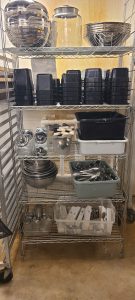 After coordinating with key partners in the reuse space, two organizations stepped forward and receivedmany items. One was a commercial restaurant that will use various kitchen racks, tubs, and the banquet equipment in its kitchen. The second, a nonprofit specializing in household goods, collected much of the glassware and plateware. In addition to these entities, a handful of other organizations and individuals in the wildlife rehabilitation, religious, and scrap metal spaces stepped forward to receive items. Many organizations did not have budgets to purchase these pieces of equipment and were grateful to receive these items at no cost. While there are still some items left on racks in the storage room, to date roughly 6,500 pounds of goods were kept out of landfills and recycling facilities. The whole purpose was reuse, every item getting continuously used for its original intended function or purpose.
After coordinating with key partners in the reuse space, two organizations stepped forward and receivedmany items. One was a commercial restaurant that will use various kitchen racks, tubs, and the banquet equipment in its kitchen. The second, a nonprofit specializing in household goods, collected much of the glassware and plateware. In addition to these entities, a handful of other organizations and individuals in the wildlife rehabilitation, religious, and scrap metal spaces stepped forward to receive items. Many organizations did not have budgets to purchase these pieces of equipment and were grateful to receive these items at no cost. While there are still some items left on racks in the storage room, to date roughly 6,500 pounds of goods were kept out of landfills and recycling facilities. The whole purpose was reuse, every item getting continuously used for its original intended function or purpose.
Reuse is a critical component to support local economies, communities, and the environment. It is a puzzle to be solved, with time and space constraints, coordination of logistics and preferences and marketing. Nonprofits are often supported through free procurement of goods, decreasing the constraint on their budgets to focus on other operational necessities. This is both an economic and social good. The environmental benefits of reuse are numerous. The waste hierarchy shows reuse is the second most preferred method of waste management, after source reduction – not having excess in the first place.
If organizations need assistance diverting excess materials from their facilities through reuse, please contact MnTAP’s Sustainable Materials Management Specialist. If you are looking to find items or rid your space of items you no longer need, consider requesting items on the MME website or listing what you have for others. Items posted as of this writing include office furniture, office supplies, totes, lockers, storage bins, and poly lined bags. MME is free for users.
For more information contact:
Jon Schroeder – Sustainable Materials Management Specialist
(612) 624 – 4645
jschro@umn.edu
MnTAP is Hiring – Interns & Full time Engineers
Interns
The Minnesota Technical Assistance Program (MnTAP) seeks junior or senior college students studying engineering or other science/technology disciplines to work on waste reduction, water conservation, and energy efficiency projects at companies in Minnesota this summer. MnTAP had a successful company recruiting effort and plans to support 16 projects during summer 2023 at locations around the state. Individual projects are hosted at separate companies and cover a variety of industries. If you know of a student looking for a great summer experience have them check out the MnTAP Intern Program Students page to see the opportunities.
Engineers
Are you looking to make a real difference for Minnesota businesses and the environment? Join our team. MnTAP is seeking an enthusiastic, mission driven colleague to join our team.
The Minnesota Technical Assistance Program (MnTAP) is an outreach and assistance program at the University of Minnesota that helps Minnesota businesses develop and implement industry tailored solutions that prevent pollution at the source, maximize efficient use of resources, and reduce energy use and cost. This position reports to a MnTAP Senior Engineer and provides engineering technical assistance and support focused on eliminating the cause of pollution or excess resource use at the source for businesses throughout Minnesota. Several important responsibilities of this position include:
- Provide technical assistance for pollution prevention, water conservation and energy efficiency
- Serve as a technical resource for businesses while honing expertise in target industry sectors
- Conduct site visits and coordinate MnTAP interns to deliver technical assistance
- Supervise student intern and manage collaborative partner research projects
- Review and update business resources to promote industrial conservation opportunities
- Conduct technical training and give technical presentations in areas of expertise
If you have ever considered making a change in order to see positive impact from your work, this opportunity could be for you.
Apply Today
The MnTAP and the University of Minnesota recognize and value the importance of diversity and inclusion in enriching the employment experience of its employees and in supporting the academic mission. We are committed to attracting and retaining employees with varying identities and backgrounds. The University of Minnesota provides equal access to and opportunity in its programs, facilities, and employment without regard to race, color, creed, religion, national origin, gender, age, marital status, disability, public assistance status, veteran status, sexual orientation, gender identity, or gender expression.
Safer TCE Alternatives
Project Overview
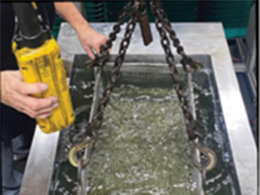 MnTAP’s effort to provide technical assistance for Minnesota businesses looking to eliminate TCE from their facilities launched in 2018 through an EPA Region 5 Pollution Prevention grant with MPCA and was expanded with additional funding from a TCE focused Supplemental Environmental Project. On June 1, 2022, Minnesota implemented a first-in-the-nation ban on TCE use for all businesses requiring an air permit. MnTAP is committed to helping businesses adjust to this change by finding long term safer solutions through solvent testing and technical assistance. Formal outreach on the TCE alternatives project will close at the end of June 2023.
MnTAP’s effort to provide technical assistance for Minnesota businesses looking to eliminate TCE from their facilities launched in 2018 through an EPA Region 5 Pollution Prevention grant with MPCA and was expanded with additional funding from a TCE focused Supplemental Environmental Project. On June 1, 2022, Minnesota implemented a first-in-the-nation ban on TCE use for all businesses requiring an air permit. MnTAP is committed to helping businesses adjust to this change by finding long term safer solutions through solvent testing and technical assistance. Formal outreach on the TCE alternatives project will close at the end of June 2023.
TCE is a hazardous air pollutant (HAP) that can contaminate soil, air, and water. TCE is a known human carcinogen, can affect the liver, kidneys, immune, reproductive, and central nervous systems, and may affect fetal development. The goal of the TCE Alternatives project is to decrease air emissions of trichloroethylene (TCE) by working with Minnesota industries to replace TCE with safer, effective options while working to avoid regrettable substitutions such as n-propyl bromide (nPB) and trans-1,2-dichloroethylene (tDCE).
Overall Project Activities
Through the end of 2022, MnTAP has reached out to businesses across Minnesota that may be using TCE with training, testing and technical assistance to help identify safer alternatives for process use.
- 126 facilities received outreach from MnTAP to connect with the program.
- 34 people from 6 facilities participated in training on the hazards of TCE and safer alternatives.
- 8 facilities received safer cleaning alternative assessments for TCE based processes.
- 11 facilities had site-based assessments of their TCE use.
- 83,000 lbs of TCE use was transitioned to alternatives by companies interacting with MnTAP
- 29,600 lbs of TCE were replaced with alternatives with verified lower hazard levels.
MnTAP will continue to provide technical assistance to any site seeking to find safer alternatives to TCE or drop-in replacements for TCE such as trans-1,2-dichloroethylene (tDCE) or n-propyl bromide (nPB).
For more information contact:
612-624-1826
janep2@umn.edu
